三年级英语下册-Module-6-Unit-1《What-do-you-do-on-Sunday》教案-外研版(三起)
- 格式:doc
- 大小:106.00 KB
- 文档页数:5

三年级英语下册教案-Module 6 Unit 1 What do you do onSundays (1)-外研版(三起)教学目标1.能听、说、读、写本单元的四会单词及句型;2.通过听、说训练,使学生能够掌握本单元中的日常活动;3.通过读、写训练,使学生能够用英语写出关于自己和别人在周末的日常活动。
教学重难点1.四会单词和句型;2.能够熟练地表达出自己和别人在周末所做的日常活动。
教学内容一、词汇1.read2.watch TV3.play computer games4.listen to music5.draw pictures6.ride a bike7.play basketball8.chat with friends9.visit grandparents10.go shopping二、句型1.What do you do on Sundays?2.I read books on Sundays.3.What does he/she do on Sundays?4.He/She watches TV on Sundays.教学过程一、听说训练1.让学生听老师读出各个单词,并跟读;2.让学生模仿老师的音调和语速,练习句型;3.在课堂上进行角色扮演练习,让学生用英语问别人周末都做什么,以及回答自己周末都做什么;4.通过故事、歌曲等方式激发学生的学习兴趣。
二、读写训练1.让学生听老师读出句子,并跟读;2.让学生自己写出和自己在周末相关的日常活动;3.通过小组合作,让学生互相交流自己的日常活动,并互相评价。
课后作业1.让学生练习在家用英语描述自己和别人在周末所做的日常活动;2.让学生收集与周末相关的英语单词和句子,以及和周末相关的图片,并制作成英语透视图或小报告;3.让学生准备一些与周末相关的英语游戏或小活动,以便下节课使用。
总结通过本课的学习,学生能够掌握本单元所教授的四会单词和句型,并熟练地表达出自己和别人在周末所做的日常活动。

【新课堂】模块6 Unit 1模块内容导读新课导学亲爱的小朋友,你喜欢学校里丰富多彩的生活吗?周一到周五,你在学校里都学习什么课程呢?周末你又会参加什么有意义的活动呢?你想不想流利地用英语表达这些内容呢?快跟我一起走进今天的英语课堂吧!学完本模块相信你一定会学到新的本领。
语法索引UIut l(第一单元)1.一般现在时简介(一) (105)2.询问对方在某一时间做某事的句型………… …一(105)3.and的用法…… …一(108)4.在上午、下午的表达 (108)5.不同的“看”…… …一(109)Unit 2(第二单元)6.have和class的用法 (112)7.辨析:lesson和class (112)8.时间和地点在句中的位置 (115)9.in the morning在句中的位置 (115)10.-般现在时简介(二) (115)模块目标预览学前必备知识目标语音字母Ll在单词中发/1/,字母Mm在单词中发/m/,字母Nn在单词中发/n/词汇同学们,下列词汇要求你们能听懂、会说、会读,会写,你们能做到吗?单词do(做),Sunday(周日),eat(吃),in(在……期间),watch(观看),have(上……课),class(课),Chinese(语文,汉语),Maths<数学),Science(科学),sleep(睡觉),today (今天),Music(音乐),Art(美术),PE(体育)短语at school(在学校),on Sundays(在周日),play football(踢足球),play basketball (打球),watch TV(看电视),in the morning(在早上),in the afternoon(在下午) 知识目标同学们,下列词汇要求你们能听懂、会说、会读,你们能做到吗?单词timetable(时间表),pupil(小学生)短语make a timetable(制作时间表)句型同学们,下列句型要求你们能听懂、会说、会读,会写,你们能做到吗?1.询问对方或他人在学校上什么课并回答。

三年级下册Module6 Unit1 What do you do on Sundays 外研版三起(含答案及解析)一、单选题(共18题)1.What do you________ on Saturdays?A.doB.doesC.go2.Tom goes ________ on Sundays.A.swimB.swimsC.swimming3.At the weekend I swimming, And he TV.A.goes; watchesB.go; watchC.go; watches4.Do you play basketball________ the morning?A.inB.onC.at5.Xiaoyong ________ in the afternoon.A.sleepB.sleepsC.sleeping6.She basketball.A.playB.playsC.does play7.What she at the weekend?A.do, doesB.does, doC.does, does8.—Do you ride a bike on Mondays?—________A.Yes, I am.B.No, I don't.C.No, you don't.9.go shoppingA.B.10.你想知道朋友在星期日做什么,可以问:A.What do you do on Sundays?B.Do you play football on Sundays?11.读单词,选出不同类的一项A.B.C.12.你想知道朋友下午是否看电视,可以问:A.Do you watch TV in the morning?B.Do you watch TV in the afternoon?13.go swimmingA.B.14.play basketballA.B.15.on SaturdaysA.B.16.你想知道朋友星期六是否去游泳,可以问:A.Do you go shopping on Saturdays?B.Do you go swimming on Saturdays?17.你想知道敲门的人是谁时,应该问:A.Who is that?B.Who are you?18.读单词,选出不同类的一项A.B.C.二、填空题(共1题)19.选择合适的答语填空(1)What do you do on Sundays? ________(2)Do you play football on Sundays?________(3)Does she like football?________(4)What do you do in the afternoon?________(5)Does he watch TV on Saturdays?________答案部分第 1 题:【答案】A【考点】动词【解析】【分析】句意是你经常在周六做什么?根据句意可知,需要使用动词原形do来表达做某事。

外研版英语三年级下册Module 6 Unit 1 What do you doon Sundays?练习题B卷姓名:________ 班级:________ 成绩:________小朋友,带上你一段时间的学习成果,一起来做个自我检测吧,相信你一定是最棒的!一、找出下列各组单词中划线部分的读音与其余三个不同的一项。
(共1题;共1分)1. (1分)选词填空:She goes to school________ (on/at) Mondays.二、选词完成句子。
(共4题;共5分)2. (2分)根据汉语提示补全短语:去上学 ________ ________ school3. (1分)根据汉语提示补全短语:看电视________TV4. (1分)根据汉语提示补全短语:踢足球________football5. (1分)选词填空:I sleep________ (on/ in) my bed.三、下列各题均有一处错误,请指出并改正。
(共4题;共4分)6. (1分)找错误并改错:I plays basketball in the morning.________7. (1分)找错误并改错:I ride my bike in Sundays.________8. (1分)That is a apple. ________9. (1分)Do she like milk? ________A B C D四、阅读短文,判断正误,在正确的句子前画“√”,在错误的句子前 (共1题;共10分)10. (10分)阅读短文,判断正误,在正确的句子前画“正确”,在错误的句子前画“错误”。
Hello! My name is Tom, I am an English boy. I’m in Class 1, Grade (3)There are 45 students in my class. Miss Wu is my teacher. She is a good teacher. I like her.(1) Tom is an English boy.(2) Tom is in Class 3, Grade (1)(3) There are 35 students in his class.(4) Miss Wu is a good teacher.(5)Tom likes Miss Wu.参考答案一、找出下列各组单词中划线部分的读音与其余三个不同的一项。

三年级下册Module 6 电子课本+课文朗读电子课本重点单词短语do [du] 做Sunday [ˈsʌndeɪ] 星期日swimming [ˈswɪmɪŋ] 游泳(运动) go swimming 去游泳eat [i:t] 吃in [ɪn] 在……期间,在……时候sleep [sli:p] 睡觉watch [wɒtʃ] 观看TV 电视节目watch TV 看电视have [həv] 做;进行,从事class [klɑ:s] 课;班级today [təˈdeɪ] 今天music [ˈmju:zɪk] 音乐has [həz] (have的第三人称单数形式)做;进行,从事Chinese [ˌtʃaɪˈni:z] 语文,汉语maths [mæθs] 数学art [ɑ:t] 美术PE=physical education[ˈfɪzɪkl] [ˌedʒuˈkeɪʃn] 体育science [ˈsaɪəns] 科学重点内容第六模块一、重点单词:do 做,干Sunday 星期日swimming 游泳(运动)go swimming 去游泳eat 吃in 在……期间,在……时候sleep 睡觉watch 观看TV 电视节目watch TV 看电视have 做;进行,从事class 课;班级today 今天music 音乐has (have的第三人称单数形式)做;进行,从事Chinese 语文,汉语maths 数学art 美术PE=physical education 体育science 科学二、重点句型:1. A: What do you do on Sundays? 你星期日做什么?B: I go swimming\watch TV\sleep.我去游泳\看电视\睡觉。
2. A: What do you do in the morning\afternoon?你早晨\下午做什么?B: I go swimming\play football\watch TV\sleep in the morning\afternoon.我早晨\下午去游泳\踢足球\看电视\睡觉。

Module 6 Unit1 What do you do on Sundays?教材分析:本节课是新标准小学英语三起新版第二册第六模块第一单元的内容。
这一单元的情境是星期日下午,Sam在去踢足球的路上遇到了Daming的堂兄Dalin(他是一名出租车司机,会伴随我们以后的英语学习)两人一边走一边谈论各自在星期日的活动安排。
能口头运用What do you do on Sundays?来谈论周末活动安排。
学情分析:对于三年级的学生,周末活动安排及学校生活是他们再熟悉不过的,尤其是自己的周末怎么过,现在的孩子业余生活也很丰富,现在正是玩心重的时候,所以这节课中尽量准备一些游戏,活动,调动他们学习英语的积极性,在设计活动时更应注意充分考虑各个层次的学生,避免成绩差得孩子掉队,出现两极分化现象。
教学目标:知识目标:1、全体学生能理解词汇do, Sunday, swimming, go swimming, in,sleep, watch, TV, watch TV。
2、全体学生能初步运用词汇do,部分学生能初步运用词汇Sunday,swimming, go swimming, in, sleep, watch, TV, watch TV。
3、部分学生能初步运用What do you do on Sundays?来谈论周末活动安排。
4、全体学生能够感知含有实意动词的一般现在时特殊疑问句语音语调。
能力目标:全体学生能听懂、会说What do you do on Sundays?部分学生会说What do you do in the morning?会谈论周末活动安排。
情感目标:学会珍惜时间,合理安排自己的日常活动。
教学重点:能运用句型What do you do on Sundays?谈论周末活动安排。
教学难点:1、生活中运用What do you do on Sundays?询问别人的周末活动安排。
2、ride a bike中i的发音,in the afternoon中the的读音。
三年级下册英语教学设计 Module 6 What do you do on Sundays.教学设计一、教学内容本教学设计基于外研社(三起)三年级下册英语课本 Module 6 What do you do on Sundays.二、教学目标1.学生能够掌握新词汇:do yoga, skateboarding, visit grandparents, watch TV, play computer games, read books2.学生能够掌握句型:What do you do on Sundays? I do yoga.3.学生能够运用所学词汇和句型描述周日的活动。
4.学生能够在交流中表达自己和他人的爱好和兴趣。
三、教学重点1.掌握新词汇和句型。
2.通过图片和视频帮助学生理解和掌握词汇和句型。
四、教学难点1.如何帮助学生在交流中自如运用所学句型和词汇。
2.如何培养学生口语表达能力。
五、教学准备1.多媒体教学设备(电脑、投影仪等)2. 课件3. 班级小游戏等(以帮助学生运用所学知识为基础)六、教学过程1. Warm-up•T: Good morning, boys and girls. How are you today?•S: Good morning, teacher. We’re fine, thank you.•T: What day is it today?•S: Today is Sunday.•T: Great! Today is Sunday. What do you usually do on Sundays?教师通过提问了解学生们平时在周日的活动,引出本节课的主题。
2. Introduction•T: Today, we are going to learn。
Moudle 6 Unit1What do you do on Sundays?说课稿一、说教学理念有了第一学期的学习,三年级学生有了一定的英语基础,更何况这一课时的设计是来源于学生日常生活的实际,因此,这一课时主要是训练学生的口语交际能力,让学生能说,让学生会说,让学生想说,本课时主要通过已学知识点,从日常的生活中入手,激发学生想说的欲望,在由浅到深,循序渐进,引导学生回忆旧有的英语词组,如play football in the morning/ in the afternoon等二、说教学内容今天我说课的内容是外研社的Moudle 6 Unit1 What do you do on Sunday s?主要学习句型what do you do on on Sundays?以及句型What do you do …? 及回答I play football/sleep/ride my bike/watch TV on Sundays/in the morn ing/ in the afternoon.三、说教材本节课是词组教学。
它是在学生巩固已学句型“do you play…等引导下学习句型”What do you do on S aturdays “从而引出词组”I play football/sleep/ride my bi ke/watch TV on Sundays/in the morning/ in the afternoon.以通过学生对句型和词组的掌握,引导学生尽可能多的新的词组,如“play ping-pong fly kite play bas ketball go swimming play chess 等”家务、休闲以及体育类的词组本课时虽然容量大,但难度不大,主要是在文本益友的基础上,强化学生对句型的巩固,并且让学生在轻松愉悦的环境中,集思广义,让学生在小组讨论中,挖掘与文本有关的知识点,让学生插上记忆的翅膀,回忆出以前学过的英语知识点,形成总的知识点,碰撞出思维的火花,这样的学习氛围深受学生的喜欢。
三年级下册英语教案-Module6 Unit1 What do you do onSunday∣外研社(三起)一、教学目标知识目标:1.掌握以下词汇:weekday, weekend, play the guitar, draw pictures, watch TV, feed the dog, visit grandparents。
2.理解并能运用以下句型:What do you do on weekdays/weekends? I play the guitar on weekends.能力目标:1.通过对话和游戏等形式,培养学生口语表达能力。
2.通过对词汇和句型的学习,提高学生听、说、读、写的综合技能。
情感目标:1.培养孩子们爱好读书、学习的兴趣和习惯。
2.让学生明白平时的生活和周末时间是需要好好安排和利用的。
二、教学重点1.词汇的认读和理解。
2.句型“What do you do on weekdays/weekends? I … onweekdays/weekends.”的运用。
三、教学难点1.句型“What do you do on weekdays/weekends? I … onweekda ys/weekends.”的运用。
2.对于游戏等形式的活动,理解和口齿表达的能力。
四、教学方法1.情境教学法2.活动教学法3.彩绘教学法4.游戏教学法五、教学过程1. Warming up1.Greet the students and ask them about their weekends.2.Ask students to stand up and stretch their arms and legs, then sit down and get ready for the class.2. Presentation1.Ask students to look at the pictures on page 44 of the textbook and tell the teacher what they see.e the attached flashcards to teach the words “weekday”, “weekend”, “play the guitar”, “draw pictures”, “watch TV”, “feed the dog”, and “visit grandparents”.3.Ask students to repeat the words after the teacher and identify the words’ meanings using the pictures.3. Practice1.Show the students a flashcard and ask, “What do you do on weekdays/weekends?” Students can answer with actions such as “I st udy on weekdays.” or “I play with my friends on weekends.” Repeat to practice the sentence structure and help students remember the vocabulary.2.Play a game called “What I like to do” where students write in a blank space what they enjoy doing in their free time, then read it aloud to the class. Afterwards, ask students to stand up and read out their classmates’ hobbies with actions.3.Divide the class into small groups and ask them to use the given vocabulary to create a story about what they did on the weekend. Afterwards, a representative from each group shares their story with the whole class.4. Production1.Ask students to work in pairs and practice the sentence structure “What do you do on weekdays/weekends? I … on weekdays/weekends.” and use the given vocabulary words to make sentences.2.Have the students fill out a worksheet with pictures of each of the new words and they must write sentences using the sentence structure taught in class.3.The students are to draw a picture of what they like to do ontheir weekends and share it with the class.5. Consolidation1.Review the new words, sentence structure, and the pupils’ production.2.Call on a couple of students to share one thing they learned today.3.End the lesson by telling the students the importance of using free time wisely.六、Homework1.Review the vocabulary and sentence structure taught in today’s class.2.Share with parents what we learned today and ask them to share their favorite activity with the student.3.Draw a picture of the favorite activity shared by their parents.七、Blackboard design1.Vocabulary: weekday, weekend, play the guitar, draw pictures, watch TV, feed the dog, visit grandparents。
三年级下册英语说课稿 Module 6 What do you do on Sundays一、教材分析1. 本模块教材本模块教材为外研社《三年级英语》下册第6模块,共2个单元,包括单元1“Do you like Saturdays?”和单元2“What do you do on Sundays?”。
2. 教学目标•语言技能目标:学生能够听、说、读、写本单元的词汇和句型。
•语言知识目标:学生能够了解并掌握本单元的词汇和基本句型。
•情感态度目标:培养学生热爱生活、积极向上的情感态度。
3. 教学重点•学习本单元的词汇和基本句型;•提高学生的听、说、读、写能力;•培养学生积极向上的情感态度。
4. 教学难点•学习本单元的新词汇,如“play soccer”、“read books”等;•听力训练,让学生听懂他人周末的活动;•口语训练,让学生能够流利地描述自己的周末活动。
二、教学设计1. 教学内容本节课主要教学内容为本单元的第二个单元“What do you do on Sundays?”。
2. 教学步骤(1)导入新课Step 1:问候与介绍老师向学生问好并介绍本堂课教学内容及目标。
Step 2:歌曲启蒙老师可以配合本单元的歌曲《What do you do on Sundays?》进行启蒙,让学生通过歌曲来熟悉新单元的主题。
(2)呈现新课Step 3:呈现图片老师呈现屏幕上的图片,分别展示学生们周末喜欢干的事情,如看书、踢足球等,并帮助学生掌握新单元的词汇和表达方式。
Step 4:看图说话通过看图片和表演的方式让学生掌握“do homework”、“watch TV”等日常生活用语。
(3)口语练习Step 5:听力训练老师播放周末活动录音,让学生听懂录音中描述的周末活动,并在听力训练中加强学生的口语理解能力。
Step 6:口语训练老师带领学生练习对话,并要求学生能够用英语口语描述自己周末的活动。
Step 7:小组讨论老师分小组进行讨论,讨论自己周末喜欢干的事情,并让学生在小组内进行英语交流,提高口语表达能力。